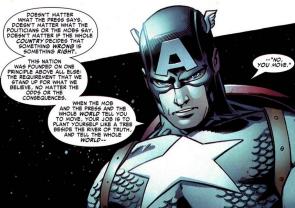It probably doesn’t bode well that these days, the word “fascism” hangs in the air and forms the backdrop to so many conversations.
It doesn’t bode well because the fact that we’re all so worried about fascism says a lot about our political mood. We see the specter of fascism lurking especially in the Trump administration. We see it in what seems to be a rise in anti-Semitism. We see it in the apparent rise of extremism on both sides of the political divide. The president says something foolishly antagonistic toward the press and celebrities tweet that “fascists hated the press, too.”
But our preoccupation with fascism doesn’t bode well for another reason, as well. After World War II, the words “fascist” and “fascism” became part of a class of words that were once terms of description but have become terms that express the speaker’s attitude toward something. English is full of such words. One innocuous example is the word “epic.” It used to describe a particular genre of literature, but now it more commonly gets used to describe the speaker’s attitude toward something (as in, “That movie was epic!” or “Watch John Doe Give This Racist An EPIC Takedown!).
When a word stops being a term of description and becomes simply an expression of the speaker’s attitude, it essentially becomes meaningless since it doesn’t say anything definite about the thing it purports to describe. The movie that I think is epic might be lame to my friend.*
Unfortunately, the word “fascism” has become a little like the word “epic.” Properly used, “fascism” describes a particular kind of political system that marries nationalism to totalitarianism. But these days, if you call someone a fascist, you’re essentially saying, “I think that so-and-so’s policies are evil.” (This is especially apparent when you consider that people on both the right and the left frequently call their political opponents “fascists.”)
The problem is that when “fascism” becomes our go-to pejorative for political opponents, we lose an element of precision in our political thinking. Not every bad person, law, or philosophy is fascist. And if we lose that precision of thought, we might forget what fascism actually looks like. (We also risk disrespecting the memories of those who suffered under real fascism in the nightmarish decades of the early twentieth century.)
I’ve been thinking about all this lately in connection with superheroes because commentators have increasingly associated the very idea of superheroes with fascism in the last few years. (This isn’t a new idea, but there seems to have been a resurgence of it lately.) For example, Glen Weldon recently argued that “superheroes are fascist ideals. They exist to symbolize the notion that might equals right, that a select few should dictate the fate of the world, and that the status quo is to be protected at all costs.” And film director Josh McTiernan complained last year that superhero movies “are made by fascists.” Ouch.
 These accusations seem to boil down to the fact that superheroes have more power than normal people and generally use that power to exert their will outside of democratic processes. In Captain America: Civil War, for example, Secretary Ross observes that the Avengers are “a group of U.S.-based, enhanced individuals who routinely ignore sovereign borders and inflict their will wherever they choose.” And in Batman v Superman: Dawn of Justice, Senator Finch wrings her hands over Superman’s willingness to act without “the consent of the governed.” As Weldon puts it, “Although conceived in a progressive spirit, the superhero genre’s central narrative has always been one of defending the status quo through overpowering might.”
These accusations seem to boil down to the fact that superheroes have more power than normal people and generally use that power to exert their will outside of democratic processes. In Captain America: Civil War, for example, Secretary Ross observes that the Avengers are “a group of U.S.-based, enhanced individuals who routinely ignore sovereign borders and inflict their will wherever they choose.” And in Batman v Superman: Dawn of Justice, Senator Finch wrings her hands over Superman’s willingness to act without “the consent of the governed.” As Weldon puts it, “Although conceived in a progressive spirit, the superhero genre’s central narrative has always been one of defending the status quo through overpowering might.”
But even if just for the sake of argument we grant that the Avengers and Superman are wrong for intervening without some sort of congressional approval or a public mandate, are their actions really fascist? Superman saves the day and then retreats to his Clark Kent identity and tries to live a normal life. Captain America risks imprisonment and even death in order to stop a terrorist plot, and in the end, gives up his identity as Captain America when he realizes that he has been duped. Neither one tries to impose his political will on anybody. It might be a problem that both Supes and Cap cause collateral damage, but their actions are hardly those of fascist dictators.
This is why it is important to understand precisely what we mean by “fascism.” The exertion of will alone doesn’t make a person fascist. If that were the case, then most politicians alive today could be considered fascist. Neither is nationalism by itself the defining characteristic of fascism. If that were true, then one could argue that the French Resistance—which, you know, fought against the Nazis—was in some sense fascist. Even the use of violent coercion doesn’t by itself make a person or a regime fascist. If it did, then we’d have to consider every single country on the planet fascist.
What does make individuals or governments fascist is the marrying of nationalism, violence, and totalitarianism. Fascism leaves no room for anything to exist besides its own ideology. Private life, individualism, and civil society disappear, leaving only the State—and no aspect of life is beyond the reach of its influence. (So, for example, in Nazi Germany, the Hitler Youth replaced the Boy Scouts.) In fascism, there is no space where the individual can think of anything other than the State.

But if we understand “fascism” in that way, then superheroes like Captain America, Superman, Batman, and others can’t be fascist because they’re inherently individualist. Captain America’s famous speech in Amazing Spider-Man #537 is a good example of this: “When the mob and the press and the whole world tell you to move, your job is to plant yourself like a tree beside the river of truth, and tell the whole world—No, you move.” That kind of thinking would have gotten a person killed in Hitler’s Germany or in Mussolini’s Italy.
Perhaps more importantly, the very idea of a secret identity belies any idea of superhero fascism. Spider-Man’s actions are public, but Peter Parker’s life is private. The same is true for Batman, Superman, and many other heroes. They act publicly as heroes, but they separate that life from their lives as private individuals. Such a distinction flies in the face of fascism, which by definition destroys the distinction between the public and the private. Private life is a threat to the Total State.
This isn’t just a matter of geek semantics or of a comic book nerd standing up for the honor of his heroes. As plenty of people have argued, superheroes are the modern American mythology, and as mythology, they both reflect our world and help us understand it. In particular, they encode our beliefs about morality, society, and political life. So if we misunderstand the heroes themselves, we’re probably going to get the world wrong, too.
Likewise, it is true that we have to guard against threats to democracy and to freedom wherever we find them, but it’s just as important to name those threats accurately and precisely. If we don’t do that, then we don’t understand them. And if we don’t understand them, then we can’t guard against them.
* C.S. Lewis, who was a philologist among other things, discusses these kinds of words in books like Studies on Words and in the introduction to Mere Christianity.

This was a fantastic read, very well said! I’m actually a community manager over here and moviepilot.com and wanted to ask if you shared your posts on any other film/TV sites? If not, would you be interested in showcasing some of your work on our site?
LikeLike
Thanks for the compliment! I might be interested. Are you asking if I want to write new material for Movie Pilot or if I want to repost some of my material from this blog at Movie Pilot?
LikeLike
You can do either or, and naturally link readers back to your original site.
LikeLiked by 1 person
Well argued and to the point. The very use of the word generally means that the user does not know what he or she is talking about.
LikeLiked by 1 person
Thanks, Reid!
LikeLike
Very good text.
The arguments to say that “Superheroes are fascists” are all empty, but how could they not be, if the word itself is completely shallow nowadays?
To say that comics show that “might equals right” is just absurd! Comics show that good equals right and that in the end the good prevails, even if the hero ist the strongest one in the fight.
All that the guys saying that kind of stuff show is that they don’t quite understand heroes and even more, don’t understand politics and history.
LikeLiked by 1 person
I agree on all points. Thanks for the comment!
LikeLike